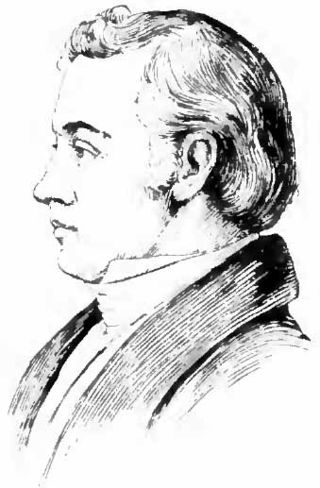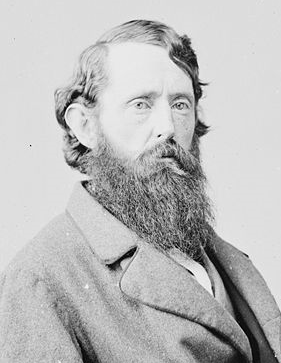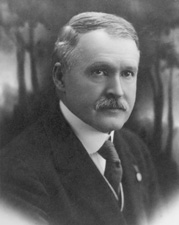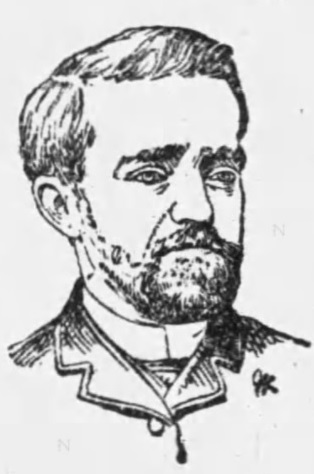
The history of Missouri begins with settlement of the region by indigenous people during the Paleo-Indian period beginning in about 12,000 BC. Subsequent periods of native life emerged until the 17th century. New France set up small settlements, and in 1803, Napoleonic France sold the area to the U.S. as part of the Louisiana Purchase. Statehood for Missouri came following the Missouri Compromise in 1820 that allowed slavery. Settlement was rapid after 1820, aided by a network of rivers navigable by steamboats, centered in the City of St. Louis. It attracted European immigrants, especially Germans; the business community had a large Yankee element as well. The Civil War saw numerous small battles and control by the Union. After the war, its economy diversified, and railroads centered in Kansas City, opened up new farmlands in the west.

Elijah Parish Lovejoy was an American Presbyterian minister, journalist, newspaper editor, and abolitionist. After his murder by a mob, he became a martyr to the abolitionist cause opposing slavery in the United States. He was also hailed as a defender of free speech and freedom of the press.

Edward Bates was an American lawyer, politician and judge. He represented Missouri in the US House of Representatives and served as the U.S. Attorney General under President Abraham Lincoln. A member of the influential Bates family, he was the first US Cabinet appointee from a state west of the Mississippi River.

Benjamin Gratz Brown was an American politician. He was a U.S. Senator, the 20th Governor of Missouri, and the Liberal Republican and Democratic Party vice presidential candidate in the presidential election of 1872.

Charles Nagel was a United States politician and lawyer from St. Louis, Missouri. He was Secretary of Commerce and Labor during President William Howard Taft's administration (1909–1913) and was one of the key founders of the United States Chamber of Commerce.

John Marshall Hamilton was the 18th Governor of Illinois, serving from 1883 to 1885. Born in Union County, Ohio, Hamilton became interested in politics at a young age, joining the Wide Awakes when he was thirteen and the Union Army four years later. After graduating from Ohio Wesleyan University he studied law and was admitted to the bar. A notable attorney in Bloomington, Illinois, Hamilton was elected to the Illinois Senate in 1876. He served there until 1881, when he was elected Lieutenant Governor of Illinois on a ticket with Shelby Moore Cullom. When Cullom resigned after election to the United States Senate, Hamilton became Governor of Illinois. He was not selected as a candidate for re-election, but did serve that year as a delegate to the 1884 Republican National Convention. He spent the rest of his life as an attorney in Chicago, where he died in 1905.

Charles Samuel Deneen was an American lawyer and Republican politician who served as the 23rd Governor of Illinois, from 1905 to 1913. He was the first Illinois governor to serve two consecutive terms totalling eight years. He was governor during the infamous Springfield race riot of 1908, which he helped put down. He later served as a U.S. Senator from Illinois, from 1925 to 1931. Deneen had previously served as a member of the Illinois House of Representatives from 1892 to 1894. As an attorney, he had been the lead prosecutor in Chicago's infamous Adolph Luetgert murder trial.

Robert Francis Morrison was the 13th Chief Justice of California from November 1879 to March 2, 1887, when he died in office.

Andrew H. Hunter was a Virginia lawyer, slaveholder, and politician who served in both houses of the Virginia General Assembly, including the Confederate House of Delegates. He was the Commonwealth's attorney for Jefferson County, Virginia, who prosecuted John Brown for the raid on Harpers Ferry.

Richard Yates was an American attorney and politician who served as the 13th Governor of Illinois from 1861 to 1865 during the American Civil War. He also represented the state in the United States House of Representatives from 1851 to 1855 and the United States Senate from 1865 to 1871.

Selden Palmer Spencer was an American lawyer and politician. A Republican, he was a United States Senator from Missouri.
Armstead Milton Alexander was an American attorney and politician from Missouri who served as a member of the United States House of Representatives from 1883 to 1885.

John Milton Glover was a U.S. Representative from Missouri, nephew of John Montgomery Glover.
William Robert Orthwein was an American sportsman, attorney, business executive and political activist.

William Barclay Napton (1808–1883) was an American politician and jurist from the state of Missouri. A Democrat, Napton served as the state's 4th Attorney General, and multiple terms on the Missouri Supreme Court.

John Dougherty was an American politician from Ohio. After a stint mining and teaching, Dougherty became an understudy of Alexander Pope Field and was admitted to the bar. He served several terms in both the Illinois House of Representatives and the Illinois Senate over the next twenty years. In 1868, he was elected Lieutenant Governor of Illinois.

Noah Walter Parden was an American attorney and politician who was active in Chattanooga, Tennessee, East St. Louis, Illinois, and St. Louis, Missouri between 1891 and 1940. In 1906 he became one of the first African-American attorneys to serve as lead counsel in a case before the United States Supreme Court, and he was among the first to make an oral argument before the Court. In 1935 he became the first African American to be appointed to the position of Assistant Prosecuting Attorney, a public office, in St. Louis.

The 1944 United States Senate election in Missouri took place on November 7, 1944 in Missouri. Incumbent Democratic Senator Bennett Champ Clark was defeated in the primary by Roy McKittrick, who went on to lose the general election to Republican nominee Forrest C. Donnell. Donnell outperformed presidential candidate Thomas E. Dewey, who lost the state with 48.4% of the vote in the presidential election.

George Smith was an American politician who was active in Ohio and Missouri. He was most notable for his service as Lieutenant governor of Missouri from 1865 to 1869, and United States Marshal for the Western District of Missouri from 1869 to 1877.

Francis Butter Murdoch was an American attorney and newspaper publisher. As a lawyer, he practiced law in Pennsylvania, Michigan, Illinois and Missouri, and initiated freedom suits for Dred Scott and Harriet Robinson Scott in 1846. Between 1840 and 1847, Murdoch filed nearly one-third of all freedom suits in St. Louis, and secured freedom for many of his clients who had been enslaved, including Polly Berry and her daughter, Lucy A. Delaney. Before that, Murdoch was the city attorney in Alton, Illinois, where he unsuccessfully prosecuted rioters who killed Elijah Parish Lovejoy, an anti-slavery newspaper publisher, in 1837.


















